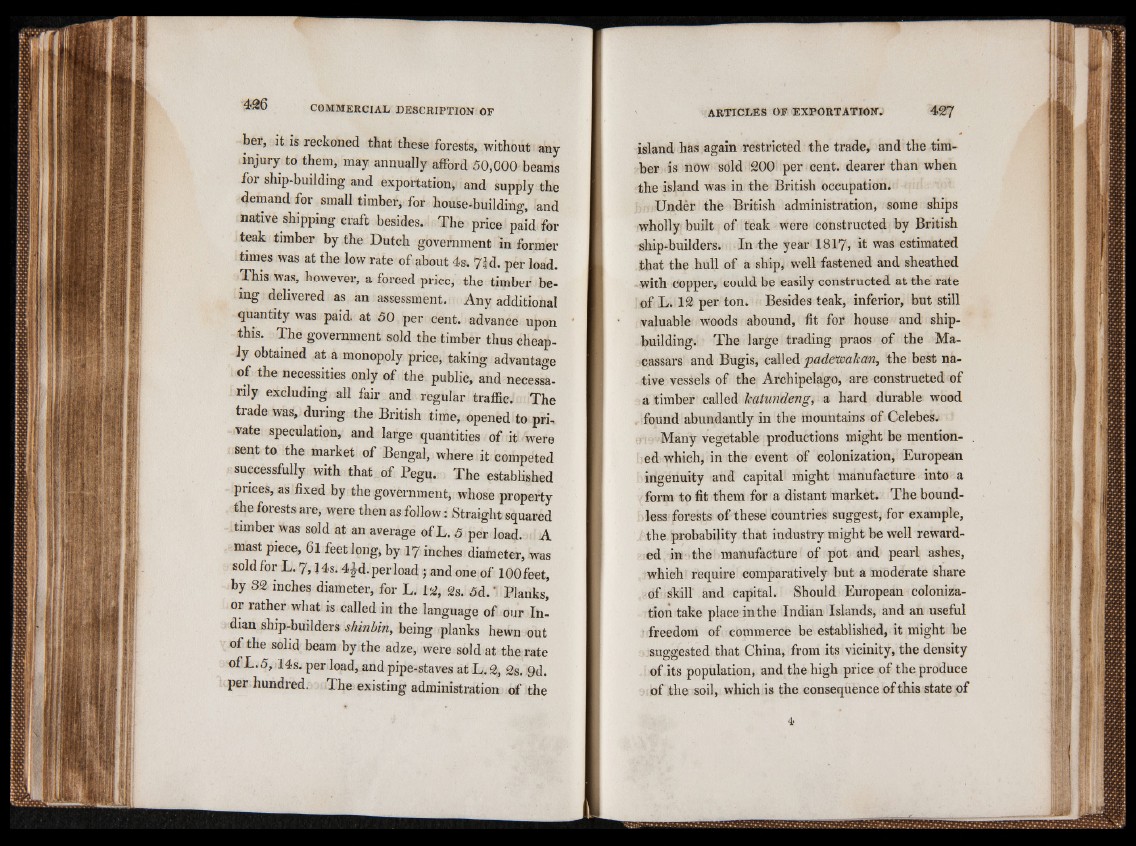
her, it is reckoned that these forests, without any
injury to them, may annually afford 50,000 beams
for ship-building and exportation, and supply the
demand for small timber, for house-building, and
native shipping craft besides. The price paid for
teafc timber by the Dutch government in former
times was at the low rate of about 4s. 7 f d. per load.
This was, however, a forced price, the timber being
delivered as an assessment. Any additional
quantity was paid, at 50 per cent, advance upon
this. The government sold the timber thus cheaply
obtained at a monopoly price, taking advantage
of the necessities only of the public, and necessarily
excluding all fair and regular traffic. The
trade was, during the British time, opened to private
speculation, and large quantities of it were
sent to the market of Bengal, where it competed
successfully with that of Pegu. The established
prices, as fixed by the government, whose property
the forests are, were then as follow : Straight squared
timber was sold at an average of L. 5 per load. A
mast piece, 61 feet long, by 1 7 inches diameter, was
sold for L. 7 , 14s. 4^d. per load ; and one of lOOfeet,
by 32 inches diameter, for L. 12, 2s. 5 d .‘ Planks,'
or rather what is called in the language of our Indian
ship-builders shinbin, being planks hewn out
of the solid beam by the adze, were sold at the rate
of L.5, 14s. per load, and pipe-staves at L. 2, 2s. 9d.
per hundred. The existing administration of the
island has again restricted the trade, and the timber
is now sold 200 per cent, dearer than when
the island was in the British occupation.
Under the British administration, some ships
wholly built of teak were constructed by British
ship-builders. In the year 18 1 7 , it was estimated
that the hull of a ship, well fastened and sheathed
with copper, could be easily constructed at the rate
of L. 12 per ton. Besides teak, inferior, but still
valuable woods abound, fit for house and shipbuilding.
The large trading praos of the Macassars
and Bugis, called padewakan, the best native
vessels of the Archipelago, are constructed of
a timber called Jcatundeng, a hard durable wood
found abundantly in the mountains of Celebes.
Many vegetable productions might be mentioned
which, in the event of colonization, European
ingenuity and capital might manufacture into a
form to fit them for a distant market. The boundless
forests of these countries suggest, for example,
the probability that industry might be well rewarded
in the manufacture of pot and pearl ashes,
which require comparatively but a moderate share
of skill and capital. Should European colonization
take place in the Indian Islands, and an useful
freedom of commerce be established, it might be
suggested that China, from its vicinity, the density
of its population, and the high price of the produce
of the soil, which is the consequence of this state of